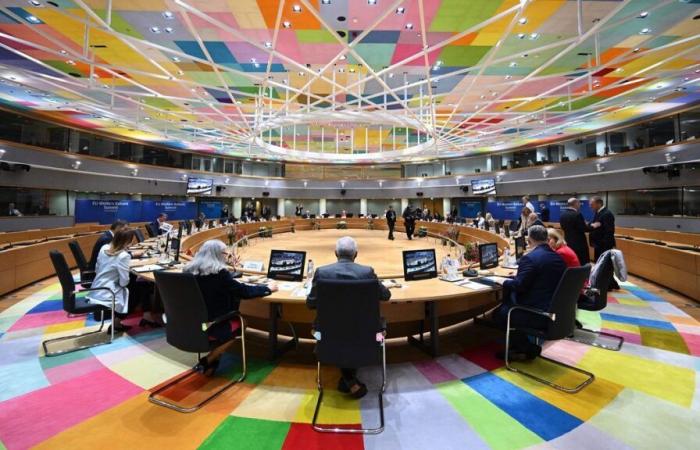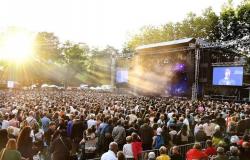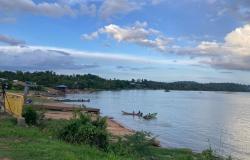Despite an agenda full of hot topics, the EU leaders’ summit is unlikely to result in a breakthrough.
ADVERTISEMENT
The 27 leaders of the European Union meet this Thursday in Brussels for a one-day summit with a remarkably busy agenda, which will address Russia’s invasion of Ukraine, the transition of power in Syria, the continuation of the demonstrations in Georgia, the new ways of reinventing migration policy and the survival guide of the future administration of Donald Trump.
This is the first summit chaired by António Costa sincehe took over the presidency of the European Council on December 1, as part of the new legislative cycle of the European Union. French President Emmanuel Macron will not be present due to the catastrophic situation in Mayotte after the passage of Cyclone Chido and will be represented by German Chancellor Olaf Scholz.
Despite a full list of topics, the high-level meeting should not lead to a breakthrough in one of them. Rather, the discussions will aim to consolidate work done at a lower level and focus minds at a time of extreme uncertainty for Europe.
The long day will begin withUkrainethe leaders’ top priority, and through a personal intervention by President Volodymyr Zelensky, who will advocate for increased military support and tougher sanctions against Russia.
Mr. Zelensky estimates that his country needs more than a dozen air defense systems, essential to protect Ukrainian cities and power plants from Russia’s relentless bombardment. The Ukrainian leader raised the subject on Wednesday evening during a meeting hosted by NATO Secretary General Mark Rutte, attended by a select group of European leaders, including Italy’s Giorgia Meloni and Poland’s Andrzej Duda.
“This is a very good opportunity to talk about security guarantees for Ukraine today and tomorrow,” Mr. Zelensky said, standing next to Mr. Rutte.
“It is very important to use these two days in Brussels to meet all our partners and have the same – which is very important – not divided (but) the same common position of Europe on how to secure the Ukraine, to strengthen ourselves, to strengthen our people.”
The summit comes at a perilous time for Kyiv, as Russian forces gain ground in the country’s east and North Korean soldiers fight in the Kursk region, some of them having already been killedaccording to American and Ukrainian officials. North Korea’s participation, estimated at around 11,000 troops, has widened the scale of the war and offered Russia a critical lifeline to offset its heavy losses on the ground.
Mr. Zelensky warned that North Korea’s deployment could reach 100,000 troops.
After the departure of the Ukrainian president, the heads of state and government will focus on an abstract discussion entitled “The EU in the world”, which will focus on Donald Trump’s return to the White Housescheduled for January 20.
Mr. Trump’s return has added to deep anxiety in the EU, which increasingly fears that Republicans will soon push to end the war with a rushed deal that would involve painful territorial concessions for kyiv. and greater military responsibility for Europeans, possibly in the form of a peacekeeping mission.
The repeated threat Trump’s decision to hit foreign products with widespread tariffs also adds to the unease. Restrictions on the rich American market could drag the European Union into a spiral of economic stagnation and industrial decline.
Leaders do not want to anticipate Mr. Trump’s actions before they materialize, because acting preemptively could risk making the wrong policy choices.
In their joint conclusions, a project of which was seen by Euronewsthe 27 will underline the principle according to which “no initiative concerning Ukraine (will) be taken without Ukraine” and will call for the “urgent intensification” of military support, such as air defense systems, munitions and missiles. The ultimate goal, diplomats explain, is to put kyiv in the strongest possible position to prepare for future negotiations with Russia.
“Europeans are very united in saying that European support for Ukraine must be maintained, even strengthened, and that we must not relax our efforts,” said a senior diplomat on condition of anonymity.
However, this unity is increasingly undermined. Hungary’s Viktor Orbán was reprimanded by Mr Zelensky for proposing a “Christmas ceasefire”, while Slovakia’s Robert Fico suggested that the EU “move from the status of arms supplier to that of peacemaker”.
Syria’s uncertain future
Besides Ukraine and Mr. Trump, the other big topic on the summit agenda will be Syria and the transition of power after 24 years of brutal rule by Bashar al-Assad.
At the start of the week, the EU made first contact with Hayat Tahrir al-Sham (HTC), the rebel force that led the offensive that toppled Assad and ushered the war-torn country into a new political era. The commitment was made at the ambassadorial level and the leaders are, for the moment, determined to keep it as is, because HTC is still on the United Nations’ blacklist of terrorist organizations and, by extension, of all EU countries, due to its previous links with Al-Qaeda and the numerous allegations of human rights violations against it.
Since the regime change, the HTC and its leader, Ahmed al-Chara, have adopted a more institutional and moderate profile, promising to dissolve all rebel factions and urging Russia to “reconsider” its controversial military presence in the country.
“Syria must remain united,” al-Chara said this week. “There must be a social contract between the state and all religions to guarantee social justice.
The group called on Western countries to lift the terrorist designation and numerous sanctions imposed on Assad’s autocracy.
“We are not naive about where these people come from and their past, but they have said a number of things that we can hold them to account for,” said a senior diplomat from another country. “Let’s see how the dust settles after the events.
Ursula von der Leyen, qui went to Türkiye this week to discuss Syria’s transition with a key regional player, the president Recep Tayyip Erdogansaid the sanctions relief would be done gradually depending on the actions HTC takes on the ground.
“We need to see real progress towards an inclusive political process,” she said.
The President of the European Commission stressed that the returns of Syrian refugees hosted in Europe should be done on a strictly voluntary basis, because the situation inside the country, ravaged by a bloody civil war, remains too volatile and risky. In the meantime, Austria has offered 1,000 euros to each Syrian refugee wishing to return to their country.
The issue of migration will also be on the agenda at Thursday’s summit, but no decision is expected. The last summit, in October, marked a major turning point when leaders approved the outsourcing of migration procedures in the form of “return centers“, camps located in distant countries where rejected asylum seekers would be transferred.
This project, which is causing legal and financial controversies, is still in its early stages.
In addition, the heads of state and government will have a brief discussion on the Georgiawhich has been rocked by consecutive nights of protests since Prime Minister Irakli Kobakhidze unilaterally announced the suspension of accession negotiations until 2028.
The violent repression of pro-EU protesters led to chaotic street clashes, arrests of opposition figures, widespread reports of injuries and hundreds of arrests, sparking a wave of condemnation overall of the European Union.
A first attempt to impose European sanctions on Georgian leaders of the repression was blocked by Hungary and Slovakia at the start of the week. As a plan B, the Commission is preparing a proposal to suspend the visa waiver for Georgian diplomats, a less severe measure than sanctions, but which only requires a qualified majority.
Alice Tidey and Maria Psara contributed to this article.






